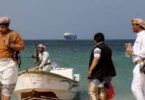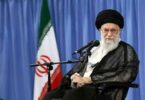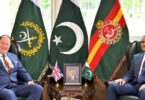Pyongyang (AFP): North Korea has developed and successfully conducted ground tests of a “new type” of solid-fuel engine for its banned intermediate-range ballistic missiles, state media said Wednesday.
The announcement came as Pyongyang also disclosed a Russian delegation led by Moscow’s natural resources minister Alexander Kozlov was visiting Pyongyang to hold talks on cooperation in trade, economy, science and technology.
The two countries’ growing military cooperation has been a source of concern for Ukraine and its allies, especially following North Korean leader Kim Jong Un’s summit with Russian President Vladimir Putin in September.
The North “has developed new-type high-thrust solid-fuel engines for intermediate ballistic missiles again, which are of important strategic significance,” Pyongyang’s official Korean Central News Agency reported.
The country also “successfully conducted the first ground jet tests of the first-stage engine and the second-stage engine on November 11 and 14 respectively,” it added.
Experts say solid-fuel missiles typically have a higher level of operational ease and safety, compared to liquid-fuel weapons.
Solid-fuel missiles don’t need to be fuelled before launch, making them harder to find and destroy, as well as quicker to use.
Testing a more technologically advanced solid-fuel missile was one of North Korean leader Kim Jong Un’s major goals in the military modernisation campaign announced in his New Year report.
In April, Pyongyang said it had successfully tested its first solid-fuel intercontinental ballistic missile — the largest, longest-range category of ballistic missile — hailing it as a key breakthrough for the country’s nuclear counterattack capabilities.
The latest engine tests “provided a sure guarantee for reliably accelerating the development of the new-type IRBM system,” KCNA said Wednesday.
The advancement is crucial “in the light of the grave and unstable security environment facing the country”, it added, in which the “enemies will get more vicious in their military collusion”.
Historic allies Russia and North Korea are both under international sanctions — the former for its invasion of Ukraine and the latter for its nuclear weapons and missile programmes.
South Korea has said Pyongyang is providing Moscow with arms in exchange for Russian space technology so that it can put a military spy satellite in orbit.
On Monday, the US and South Korean defence chiefs updated for the first time in a decade a key military agreement to counter Pyongyang and its growing nuclear threats.
Russian delegation in North Korea to ‘further revitalise’ ties
A Russian delegation led by natural resources minister Alexander Kozlov is visiting Pyongyang, North Korea’s state media said Wednesday, with the two countries’ growing cooperation triggering concern in Washington and Seoul.
The visit comes less than a week after US Secretary of State Antony Blinken warned that ties between Pyongyang and Moscow were “growing and dangerous”, urging the North’s ally China to restrain the nuclear-armed country.
The delegation arrived in Pyongyang on Tuesday, the state official Korean Central News Agency reported, to discuss “cooperation in trade, economy, science and technology”.
Historic allies Russia and North Korea are both under international sanctions — the former for its invasion of Ukraine and the latter for its nuclear weapons and missile programmes.
South Korea accuses Pyongyang of having provided over one million artillery rounds to Moscow for use in its war with Ukraine. Seoul says the North appears to have received advice on military satellite technology in return.
The latest Russian visit comes after the G7’s top diplomats last week slammed the arms transfers, urging North Korea and Russia to “immediately cease all such activities”.
The two countries have ramped up cooperation following North Korean leader Kim Jong Un’s summit with Russian President Vladimir Putin in September.
Kim had travelled to Russia aboard a special bullet-proof train, declaring bilateral ties with Moscow were his country’s “number one priority”.
Russia wishes to develop “substantial cooperation in accordance with the agreements reached at the Russia-DPRK summit”, KCNA said Wednesday, using the North’s official name.
Images released by KCNA showed the Russian delegation laying a wreath at the Mansudae Grand Monument in Pyongyang, where giant statues of North Korea’s former leaders are located.
A reception was held at one of the capital’s largest hotels, KCNA said, where officials agreed to “further revitalise the bilateral relations in all fields and develop them onto a new high stage”.
KCNA also said Wednesday that a North Korean delegation headed by the country’s sports and culture minister left to attend a forum in the Russian city of Perm.
Analysts say the latest moves indicate both countries are keen to emphasise their growing alliance, despite global criticism.
The North “could potentially expand its planned trade by exporting war-related goods to Russia”, Ahn Chan-il, a defector-turned-researcher who runs the World Institute for North Korea Studies, told AFP.
Impoverished Pyongyang would do so “in exchange for importing food and energy resources”, he added.







